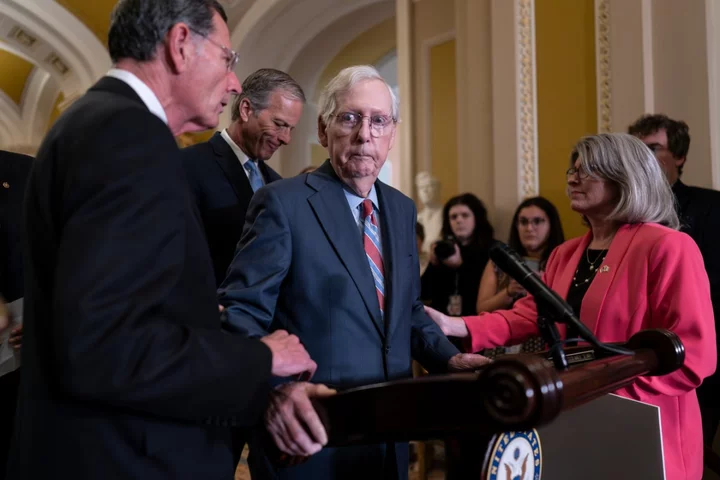
Mitch McConnell’s health history reveals previous issues as he freezes during briefing
Mitch McConnell froze and briefly appeared to be unable to continue speaking during a Senate Republican press conference. He was led away by colleagues and returned not much later, stating that he was “fine”. This is not the first time that the 81-year-old has had a health scare. The scene occurred on Wednesday as Republicans held their last weekly press briefing before the August recess, and discussed remaining business including the chamber’s effort to pass a defence spending bill before the holiday begins. Mr McConnell was seen freezing at the podium for several seconds before a number of senators, including Joni Ernst of Iowa, approached him and encouraged him to step away. He did so, only to come back a few minutes later. He refused to elaborate on what had just occurred. “Can you address what happened here at the start of the press conference? Was it related to your injury from earlier this year when you suffered a concussion?” asked CNN’s Manu Raju. “I’m fine,” responded the senator. “You’re fine? You’re fully able to do your job?” Raju asked in response, to which the minority leader replied: “Yeah.” Mr McConnell entered the Senate in 1985 and has been the top Republican since 2007. Mr McConnell’s freezing at the press conference is likely to be looked at with scrutiny given the renewed interest in the issues presented by the increasingly advanced ages of many of the members of the upper chamber of Congress. Senator Dianne Feinstein of California, in particular, has been the subject of intense criticism on the matter as many have argued that the 90-year-old, who has sometimes appeared confused in interactions with reporters and staff, is no longer up to serving. This is a rundown of Mr McConnell’s previous health issues: Childhood polio He continues to walk with a limp, a residual issue caused by his battle with polio at a young age. When Mr McConnell was two years old in 1944, his upper left leg was paralyzed by polio and he was treated at the Warm Springs Institute in Georgia established by Democratic World War II President Franklin Delano Roosevelt for his own struggle with the same disease. “When I was a child and my dad was in World War II, I got polio. I recovered, but my family almost went broke,” Mr McConnell said in a 1990 re-election ad. “Today, too many families can’t get decent, affordable health care. That’s why I’ve introduced a bill to make sure healthcare is available to all Kentucky families, hold down skyrocketing costs, and provide long-term care.” Since that ad, Mr McConnell has been criticized by his political opponents for working against affordable healthcare. In 2020, as the Covid-19 pandemic was underway, Mr McConnell told the AP that it reminded him of having polio as a child. “Why does this current pandemic remind me of that? I think number one is the fear,” he said. “And the uncertainty you have when there’s no pathway forward on either treatment or a vaccine and that was the situation largely in polio before 1954.” At the time of the AP interview, only 16,000 people in the US had died of Covid-19. As of today, more than 1.1 million have died in the US as a result of the pandemic, according to the WHO. “There’s hope that we’re going to get on top of this disease within a year, year and a half,” Mr McConnell told the AP in 2020. Speaking about his childhood polio, Mr McConnell grew emotional as he said he was “lucky” to have a mother “who was determined to see me walk again”. “Tenacity, hard work and not giving up – my mother instilled all that in me before I was four years old and I think it’s been a guiding principle in how I lead my life,” he added. Asked how his mother could afford his polio treatment, Mr Connell told the AP: “Honestly, I don’t know the answer to that.” He recalled the relief at the arrival of the polio vaccine. “I’ve had a normal life, but I’ve been acutely aware of the disease that I had and the relief that the country had when they found the vaccine,” he said in 2020, months ahead of the Covid-19 vaccine’s arrival. “We’re going to get that relief.” Triple heart bypass surgery Mr McConnell had a triple heart bypass surgery in February 2003 in connection to blocked arteries. The procedure was conducted at the National Naval Medical Center in Bethesda, Maryland, just outside Washington, DC. A fall that caused a concussion The 81-year-old Mr McConnell returned to the Senate in March of this year after suffering a fall that caused a concussion. “Leader McConnell tripped at a dinner event,” communications director David Popp said at the time, adding that Mr McConnell would be in hospital for “a few days of observation and treatment”. The event was at the Waldorf Astoria DC – previously the Trump International Hotel from 2012 to 2022. One of the colleagues at Mr McConnell’s side guiding him away after he froze on Wednesday, Senator John Barrasso of Wyoming, a physician by training, said at the time that he expected that Mr McConnell would make a full recovery. Mr McConnell also fell at his home in Louisville, Kentucky in August 2019, suffering a shoulder fracture. Read More Mitch McConnell leaves press conference abruptly after appearing unable to speak Kevin McCarthy denies he made any deal with Trump to try to expunge his impeachments Kentucky attorney general can’t explain why he hasn’t used key to his office in three years Mitch McConnell recently ‘fell in airport and was using wheelchair’ before blackout Trump wants to see Biden impeached, and other Republicans are quick to pile on Mitch McConnell’s health history reveals previous issues after briefing freeze
2023-07-27 16:52
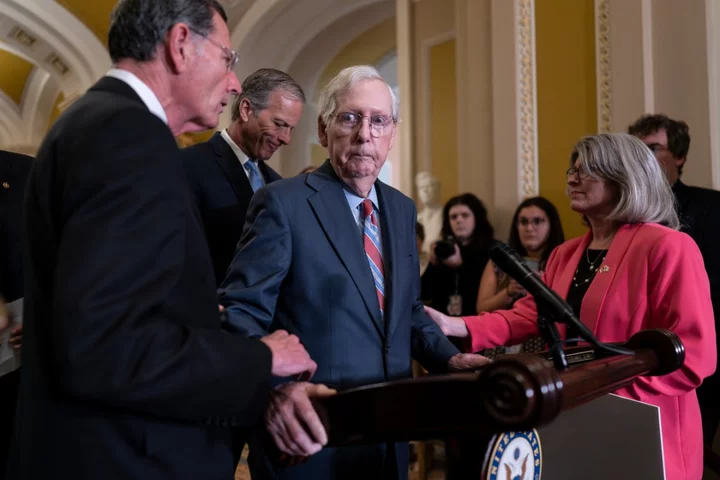
Mitch McConnell recently ‘fell in airport and was using wheelchair’ before press conference blackout
Senate minority leader Mitch McConnell reportedly tripped and fell while disembarking from a plane earlier this month before he abruptly froze mid-sentence during a news conference on Wednesday, according to reports. Mr McConnell fell from a plane at Ronald Reagan Washington National Airport on 14 July after the flight was cancelled and everyone had boarded the plane, two sources told NBC News. The 81-year-old has recently started using a wheelchair as a precaution while travelling in crowded places such as airports, a source said. A passenger who was in the same plane as Mr McConnel said he had a “face plant” and another passenger helped the Republican leader, according to the report. On Wednesday, he abruptly stopped while speaking during the weekly Republican leadership press conference and had to be led away by colleagues. The Kentucky senator stared vacantly for around 20 seconds before his colleagues who were standing behind him asked him if he wanted to return to his office. He did not respond but slowly walked back. He returned later to the conference and said he is “fine” and answered questions from the press. “The president called to check on me. I told him I got sandbagged,” he joked, in an apparent reference to a quote from Joe Biden in June he made after he tripped over a sandbag and fell while onstage at the US Air Force Academy graduation. A polio survivor as a child, Mr McConnel has long acknowledged some difficulty as an adult in climbing stairs. Mr McConnel was out of the Senate for almost six weeks after he sustained a concussion and fractured a rib when he fell and hit his head after a dinner event at a hotel earlier this year. He was hospitalised for several days. In 2019, he also tripped and fell at his home in Kentucky, causing a fracture in his shoulder and required surgery. “He’s definitely slower with his gait,” a Republican senator was quoted saying by NBC. They added that “he doesn’t address” his health issues even during closed-door meetings with GOP leaders. Read More Mitch McConnell leaves press conference abruptly after appearing unable to speak Trump news – live: Trump begs Congress to help save him from legal troubles as Jan 6 indictment decision looms North Korean leader Kim Jong Un meets with Russian defense minister on military cooperation Trump wants to see Biden impeached, and other Republicans are quick to pile on Mitch McConnell’s health history reveals previous issues after briefing freeze Mitch McConnell leaves press conference abruptly after appearing unable to speak
2023-07-27 13:28
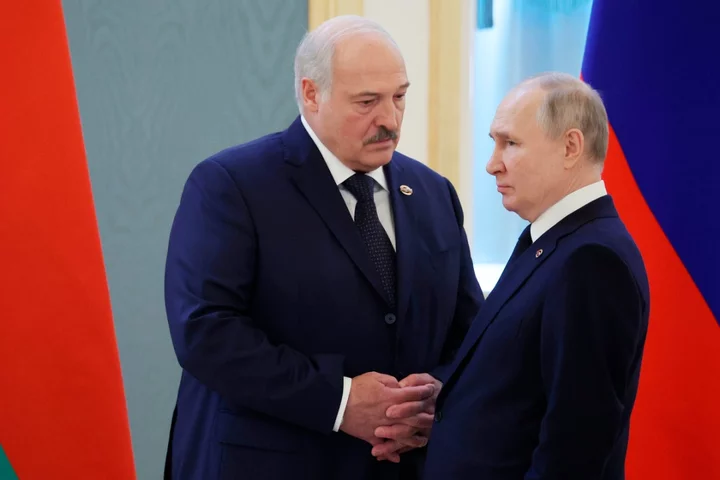
Bluffing or not, Putin’s declared deployment of nuclear weapons to Belarus ramps up saber-rattling
Sometime this summer, if President Vladimir Putin can be believed, Russia moved some of its short-range nuclear weapons into Belarus, closer to Ukraine and onto NATO's doorstep. The declared deployment of the Russian weapons on the territory of its neighbor and loyal ally marks a new stage in the Kremlin’s nuclear saber-rattling over its invasion of Ukraine and another bid to discourage the West from increasing military support to Kyiv. Neither Putin nor his Belarusian counterpart, Alexander Lukashenko, said how many were moved — only that Soviet-era facilities in the country were readied to accommodate them, and that Belarusian pilots and missile crews were trained to use them. The U.S. and NATO haven’t confirmed the move. NATO Secretary-General Jens Stoltenberg denounced Moscow’s rhetoric as “dangerous and reckless,” but said earlier this month the alliance hasn’t seen any change in Russia’s nuclear posture. While some experts doubt the claims by Putin and Lukashenko, others note that Western intelligence might be unable to monitor such movement. Earlier this month, CNN quoted U.S. intelligence officials as saying they had no reason to doubt Putin’s claim about the delivery of the first batch of the weapons to Belarus and noted it could be challenging for the U.S. to track them. Unlike nuclear-tipped intercontinental ballistic missiles that can destroy entire cities, tactical nuclear weapons for use against troops on the battlefield can have a yield as small as about 1 kiloton. The U.S. bomb in Hiroshima in World War II was 15 kilotons. The devices are compact: Used on bombs, missiles and artillery shells, they could be discreetly carried on a truck or plane. Aliaksandr Alesin, an independent Minsk-based military analyst, said the weapons use containers that emit no radiation and could have been flown into Belarus without Western intelligence seeing it. “They easily fit in a regular Il-76 transport plane,” Alesin said. “There are dozens of flights a day, and it’s very difficult to track down that special flight. The Americans could fail to monitor it.” Belarus has 25 underground facilities built during the Cold War for nuclear-tipped intermediate-range missiles that can withstand missile attacks, Alesin said. Only five or six such depots could actually store tactical nuclear weapons, he added, but the military operates at all of them to fool Western intelligence. Early in the war, Putin referenced his nuclear arsenal by vowing repeatedly to use “all means” necessary to protect Russia. He has toned down his statements recently, but a top lieutenant continues to dangle the prospect with terrifying ease. Dmitry Medvedev, the deputy head of Russia’s Security Council who served as a placeholder president in 2008-12 because Putin was term-limited, unleashes near-daily threats that Moscow won’t hesitate to use nuclear weapons. In a recent article, Medvedev said “the apocalypse isn’t just possible but quite likely,” and the only way to avoid it is to bow to Russian demands. The world faces a confrontation "far worse than during the Cuban missile crisis because our enemies have decided to really defeat Russia, the largest nuclear power,” he wrote. Many Western observers dismiss that as bluster. Putin seems to have dialed down his nuclear rhetoric after getting signals to do so from China, said Keir Giles, a Russia expert at Chatham House. “The evident Chinese displeasure did have an effect and may have been accompanied by private messaging to Russia,” Giles told The Associated Press. Moscow’s defense doctrine envisages a nuclear response to an atomic strike or even an attack with conventional weapons that “threaten the very existence of the Russian state.” That vague wording has led some Russian experts to urge the Kremlin to spell out those conditions in more detail and force the West to take the warnings more seriously. “The possibility of using nuclear weapons in the current conflict mustn’t be concealed,” said Dmitry Trenin, who headed the Moscow Carnegie Center for 14 years before joining Moscow’s state-funded Institute for World Economy and International Relations. “The real, not theoretical, perspective of it should create stimuli for stopping the escalation of the war and eventually set the stage for a strategic balance in Europe that would be acceptable to us,” he wrote recently. Western beliefs that Putin is bluffing about using nuclear weapons “is an extremely dangerous delusion,” Trenin said. Sergei Karaganov, a top Russian foreign affairs expert who advises Putin’s Security Council, said Moscow should make its nuclear threats more specific in order to “break the will of the West” and force it to stop supporting Ukraine as it seeks to reclaim Russian-held areas in a grinding counteroffensive. “It’s necessary to restore the fear of nuclear escalation; otherwise mankind is doomed,” he said, suggesting Russia establish a “ladder" of accelerating actions. Deploying nuclear weapons in Belarus was the first step, Karaganov said, with perhaps a follow-up of warning ethnic Russians in countries supporting Ukraine to evacuate areas near facilities that could be nuclear targets. If that doesn’t work, Karaganov suggested a Russian nuclear strike on Poland, alleging Washington wouldn’t dare respond in kind to protect a NATO ally, for fear of igniting a global war. “If we build the right strategy of intimidation and even the use of it, the risk of a retaliatory nuclear or any other strike on our territory could be reduced to a minimum,” he said. “Only if a madman who hates his own country sits in the White House would America risk to launch a strike ‘in the defense’ of the Europeans and draw a response, sacrificing Boston for Poznan.” The Moscow-based Council of Foreign and Defense Policies, a panel of leading military and foreign policy experts that includes Karaganov, denounced his comments as “a direct threat to all of mankind.” While pro-Kremlin analysts floated such scenarios, Lukashenko, the Belarusian leader, says hosting Russian nuclear weapons in his country is meant to deter aggression by Poland. He claimed a number of nuclear weapons were flown to Belarus without Western intelligence noticing, with the rest coming later this year. Officials in Moscow and Minsk said the warheads could be carried by Belarusian Su-25 ground attack jets or fitted to short-range Iskander missiles. Giles, of Chatham House, said the deployment was about “cementing Putin’s control over Belarus” and did not offer Moscow any military advantage over placing them in Russia’s Baltic exclave of Kaliningrad that borders Poland and Lithuania. The West should recognize this as a ploy "that has far more to do with Russia’s ambitions for Belarus than any genuine impact on European security beyond that,” Giles said. Some observers question whether the deployment to Belarus has even happened. Miles Pomper, a senior fellow at the James Martin Center for Nonproliferation Studies at the Middlebury Institute, challenged Lukashenko’s claim that nuclear weapons were covertly flown to Belarus. They are normally moved by rail, he said, and there are no signs of "the support elements that you would see that would go with shipments of weapons.” Others note Russia could have deployed the weapons without adhering to protocols used in the 1990s, when Moscow wanted to show the West its nuclear arsenal was secure amid economic and political turmoil. Belarusian military analyst Valery Karbalevich said keeping such details secret could be a Kremlin strategy of "applying permanent pressure and blackmailing Ukraine and the West. The unknown scares more than certainty.” Alesin, the Minsk-based analyst, argued that U.S. and NATO may play down the deployment of nuclear weapons to Belarus because they pose a threat the West finds difficult to counter. “The Belarusian nuclear balcony will hang over a large part of Europe. But they prefer to pretend that there is no threat, and the Kremlin is just trying to scare the West,” he said. If Putin decides to use nuclear weapons, he may do it from Belarus in hopes that a Western response would target that country instead of Russia, Alesin said. The political opposition to Lukashenko warns that such a deployment turns Belarus into a hostage of the Kremlin. While Lukashenko sees such weapons as a “nuclear umbrella" protecting the country, "they turn Belarus into a target,” said exiled opposition leader Sviatlana Tsikhanouskaya, who tried to unseat the authoritarian leader in a 2020 election widely viewed as fraudulent. “We are telling the world that preventative measures, political pressure and sanctions are needed to resist the deployment of nuclear weapons to Belarus," she said. "Regrettably, we haven’t seen a strong Western reaction yet.” ___ Yuras Karmanau in Tallinn, Estonia, Jill Lawless in London and Ellen Knickmeyer in Washington contributed. ___ The Associated Press receives support for nuclear security coverage from the Carnegie Corporation of New York and Outrider Foundation. The AP is solely responsible for all content. ___ Follow AP's coverage of the war in Ukraine at https://apnews.com/hub/russia-ukraine Read More Ukraine war’s heaviest fight rages in east - follow live Charity boss speaks out over ‘traumatic’ encounter with royal aide Ireland won’t offer condolences to Russia if Putin dies, Varadkar says Ireland unlikely to offer condolences to Russia if Putin dies, Varadkar says Angry Russia refuses to speak at UN meeting on its attacks on Ukraine's key port city of Odesa.
2023-07-27 13:22
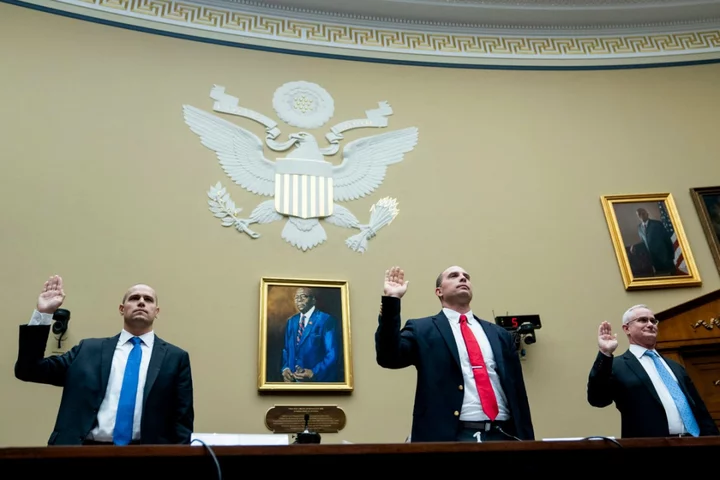
Explosive claims, impossible craft and questions of ‘murder’: House UFO hearing probes alleged alien technology defying laws of physics
Aliens and UFOs were the topic du jour in Washington DC as the House Subcommittee on National Defense met to hear testimony from three men — two Navy pilots and one former intelligence officer — who are warning that the skies may not be as safe as Americans previously thought. While the hearing was not specifically probing whether or not aliens have visited Earth — instead being ostensibly focused on the alleged prevalence of unidentified aerial objects over US skies — the discussion of extraterrestrials and "non-human biologics" no less permeated the discussion. The three men who sat before the subcommittee were David Grusch, a former intelligence officer in the Air Force and National Geospatial Intelligence Agency; former Navy pilot Ryan Graves, who claims to have encountered UAPs during missions; and David Fravor, another Navy pilot, who recorded the infamous "Tic Tac" UAP video in 2004. The witnesses agreed that the US is lacking in a proper reporting system for UAP sightings, with Mr Graves noting that both military and commercial pilots who claim to have encountered the craft feel as though they cannot report the sightings without suffering stigma and potential career retaliation. The witnesses Mr Graves was most concerned with the dearth of reporting options for pilots who encounter the supposed craft. He had his own experience in 2014, when a squadron under his command encountered "dark grey or black cubes ... inside of a clear sphere, where the apex or tips of the cubs were touching the inside of that sphere" approximately 10 miles off the coast of Virginia Beach. He said his pilots described the craft performing impossible aerial maneuvers that he said would kill a human and were far beyond the capability of any known technology. Mr Graves further stated that such encounters were "not rare, or isolated" and that there was no official means of reporting such encounters. "If everyone could see the sensor and video data I witnessed, our national conversation would change," Mr Graves said in his opening statement. "I urge us to put aside stigma and address the security and safety issue this topic represents. If UAP are foreign drones, it is an urgent national security problem. If it is something else, it is an issue for science. In either case, unidentified objects are a concern for flight safety. The American people deserve to know what is happening in our skies. It is long overdue." Mr Fravor offered an account of his 2004 incident off the coast of San Diego, during which he said he encountered a "smooth" white object he likened to a tic tac mint or a propane tank. He said he spotted it hovering over the water before it rapidly ascended, accelerated, and disappeared. He noted that there was white water beneath the craft — suggesting something may have been under the water — and that the white water was gone after it disappeared. "I think what we experienced was, like I said, well beyond the material science and the capabilities that we had at the time, that we have currently or that we're going to have in the next 10 to 20 years," Mr Fravor said. The "Tic Tac video" was featured in a 2017 New York Times article discussing UAPs written by the same individuals who first reported on Mr Grusch's whistleblower claims. Both pilots agreed that the UAPs they encountered represented national security threats to the United States. Mr Grusch, who spent 14 years working as an intelligence officer, offered the most fantastic of the claims during the hearing, but provided the least evidence of any of the witnesses. He said he decided to blow the whistle on the US government after learning from another individual that the US has retrieved wreckage from UAPs and is currently reverse-engineering the technology. “I was informed in the course of my official duties of a multi-decade UAP crash retrieval and reverse engineering program to which I was denied access,” he said. He further claimed that a UAP the size of a football field has been concealed somewhere, and that "non-human biologics" were found piloting some of the crashed UAPs. Mr Grusch has made clear that he was not a personal witness to any of what he claims, but is repeating what he was told by individuals he deems as credible. The Pentagon has denied his claims of a coverup. Sue Gough, a Defense Department spokesperson, said investigators have not found “any verifiable information to substantiate claims that any programs regarding the possession or reverse-engineering of extraterrestrial materials have existed in the past or exist currently.” The statement did not address the recovery of craft not suspected of being extraterrestrial in nature. During the hearing, Congressman Tim Burchett asked Mr Grusch if he was aware of anyone who had been harmed in the interest of the US government maintaining secrecy about the alleged crashed UAPs. "Do you have any personal knowledge of people who have been harmed or injured in efforts to cover-up or conceal these extra-terrestrial technologies," he asked. “Yes. Personally,” he replied. Mr Burchett then asked, "has anyone been murdered?" Mr Grusch hesitated for a moment. "I have to be careful asking [sic] that question," he said, citing a current investigation into whether or not he was the subject of retaliatory action for whistleblowing. "I directed people with that knowledge to the appropriate authorities." He further went on to claim that he was aware of planned retaliation efforts against him by his former superiors in the US government, and that he was aware of unsanctioned "IRAD" programs in which government contractors were overcharging American government buyers and using the excess profit to funnel into DOD research programs. Lines for the hearing stretched far down the hall, with UFO enthusiasts mixing alongisde the media in hopes of witnessing "disclosure" — the long-awaited acknowledgment by the US government that we are not alone in the universe. However, they were left with only a tease of information; each time Mr Grusch was asked to provide specific information — details about the IRAD programs, the locations of supposed crashed UAPs, specifics about the "non-human" entities allegedly found with the wreckage — he assured the Congressional leaders that he knew the answers, but could not provide them publicly. He said he could provide specific information only in a closed session or in a secure environment, citing confidentiality concerns. Congressional questions The bipartisan subcommittee expressed appreciation for the witnesses' testimonies and broadly operated from the position that the government was withholding information concerning the true nature of UAPs — whether they are controlled by foreign adversaries, aliens, or something else entirely — and several members assured the witnesses they would be protected for possible retaliation. While Mr Graves and Mr Fravor said they did not experience blowback for their reports, Mr Grusch claimed he had, prompting Congressman Jamie Raskin to ask for details about his experiences. He said he was aware of "active planned reprisal" coming from "leadership at my previous organisation," and said he referred to the retaliation as "administrative terrorism." Congresswoman Alexandria Ocasio-Cortez centred her questioning on Mr Grusch's claims concerning independent research and development — IRAD — programs funneling money from American government buyers into "unsanctioned" DOD programs. Earlier in his testimony, Mr Grusch told Congressman Jared Moskowitz he was aware of IRADs funding "unsanctioned" development of "advanced technology." Ms Ocasio-Cortez said she had seen IRAD programs and regulations requiring agencies initiating research to notify oversight bodies abused, and asked "if you were me, where would you look" to find evidence for the claims that government contract money was being siphoned to unrelated research and development. Mr Grush said he would be happy to provide the details "in a closed environment" and said he could tell her "specifically." Congresswoman Nancy Mace zeroed in on what many of the attendees were likely hoping to hear addressed; the existence of aliens. “Do you believe our government has made contact with intelligence extraterrestrials,” she asked. Mr Grusch said it was “something I can’t discuss in a public setting,” resulting in a curious eyebrow raise from longtime UFO researcher, reporter, and occasional Coast to Coast AM guest host George Knapp, who was seated behind Mr Grusch. Ms Mace continued, asking “if you believe we have crashed craft ... do we have the bodies of the pilots who piloted [these] craft?” “As I’ve stated publicly already in my NewsNation interview, biologics came with some of these recoveries, yeah.” She then asked if they were “human or non-human biologics?” “Non-human, and that was the assessment of people with direct knowledge on the program I talked to, [who] are still on the program,” he said. Ms Mace then asked if any evidence — photo, video, eyewitnesses — of such creatures existed. “The specific documentation I would have to talk to you in a SCIF about,” he replied. Congressman Glenn Grothman, who chaired the subcommittee, said he anticipated legislation would come out of continued, closed-door discussions with the witnesses. "Several of us are going to look forward to getting some answers in a more confidential setting," he said. "I assume some legislation will come out of this." Read More Congressman asks UFO whistleblower if anyone has been ‘murdered’ to maintain alleged coverup Tom DeLonge left Blink-182 for an alien adventure. Now back on tour, his UFO mission is taking off in Congress Republican lawmaker claims US is ‘hiding evidence’ of UFOs which ‘defy physics as we know it’ Watch: Congress holds hearing on UFOs What to expect from the House committee hearing looking into UFOs Biden looks to provide relief from extreme heat as record temperatures persist
2023-07-27 12:57

McConnell has fallen multiple times this year, sources say
Senate GOP Leader Mitch McConnell, who froze during a news conference Wednesday and earlier this year suffered a concussion after falling down, has also endured two other falls this year, according to multiple people familiar with the matter.
2023-07-27 12:48
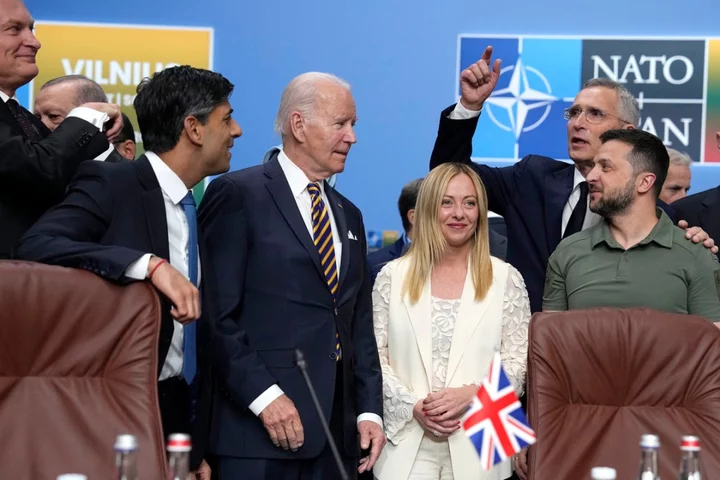
Biden is welcoming far-right Italian Prime Minister Meloni for White House talks
President Joe Biden is set for talks with Italian Prime Minister Giorgia Meloni on Thursday, welcoming the far-right leader who has won praise from the U.S. administration for her strong backing of the U.S.-led effort to assist Ukraine as it tries to fend off the Russian invasion. The warm reception comes after initial trepidation in the Biden administration about Meloni, who rose to power last year as the head of Italy’s most far-right government since the end of World War II. Biden administration concerns about her ideology have been eased by her support for Ukraine and her seeming openness to pull back from Italy's participation in China's infrastructure-building Belt and Road Initiative. Her visit comes as Italy prepares to take up the presidency next year of the Group of Seven industrialized nations. White House officials said that in addition to discussing Ukraine and China, the two leaders were expected to discuss migration from North Africa to Europe's southern shores. More than 1,900 migrants have died or gone missing in the Mediterranean so far this year, bringing the total of dead and missing since 2014 to 27,675, according to the International Organization for Migration. “On issues of foreign policy, there’s been a lot of overlapping and mutually reinforcing approaches that we’re taking on with Italy,” White House National Security Council spokesman John Kirby said. “Italy is a NATO ally and they are a very competent NATO ally and they’ve been a tremendous supporter of Ukraine.” The Biden administration viewed Meloni's predecessor, economist and former European Central Bank chief Mario Draghi, as an intellectual force and one of its strongest allies in Europe. Soon after Meloni's victory last September, Biden warned about the rise of hard-right populism in Europe and in the United States. “You just saw what’s happened in Italy in that election,” Biden said in an address to the Democratic Governors Association after Meloni’s victory last September. “You’re seeing what’s happening around the world. And the reason I bother to say that is we can’t be sanguine about what’s happening here either.” Meloni became Italy’s first far-right leader to hold the premiership in Italy’s post-World War II republic after the Brothers of Italy party she co-founded more than a decade ago emerged as the largest vote-getter in the September 2022 elections. Her Brothers of Italy party, named after the first words of Italy’s national anthem, has roots in a party founded by nostalgists for fascism following the demise of dictator Benito Mussolini’s regime. But Meloni brushes off any insinuation that she is nostalgic for Mussolini, writing in her autobiography, “I don’t hold the cult of fascism.” Since coming to power, Meloni has faced criticism for her government's direction that city halls stop automatically registering both parents in same-sex couples but instead limit recognition of parental rights only to the biological parent of the child. When Meloni ran for the premiership, she called for a naval blockade of northern Africa to thwart smugglers’ boats overcrowded with migrants determined to reach Europe’s southern shores. But once in office, she quickly dropped talk of any blockade. On the eve of Meloni's visit, the White House sought to stress the U.S. and Italy's close cooperation on Ukraine. Kirby noted that Meloni has been one of the European Union’s most vocal supporters of Ukraine's sovereignty, and Italy has hosted some 170,000 Ukrainians who have fled the war. Meloni has also been a champion of a stronger NATO and views the trans-Atlantic alliance as the linchpin of traditionally strong U.S.-Italian relations. “From a foreign policy lens, the Biden administration sees this is better than what they could have possibly expected or hoped for,” said Max Bergmann, director of the Europe, Russia and Eurasia Program at the Center for Strategic and International Studies in Washington. The prime minister has also expressed skepticism about Italy's ties with China through the Belt and Road Initiative. In 2019, Italy became the first and only G7 nation to join China’s ambitious infrastructure building effort, despite objections from the United States. The project was launched by Beijing in 2013 by President Xi Jinping to link East Asia and Europe through physical infrastructure. The ambition for the project has expanded to Africa, Oceania and Latin America, significantly broadening China’s economic and political influence. Italy must either renew or abandon the accord by early next year. Kirby called Italy's decision on whether to stay in Belt and Road a “sovereign decision” but added that “it's becoming increasingly obvious that more and more countries around the world are seeing the risks, and quite frankly lack of reward for economic partnerships with China.” Meloni is also scheduled to meet with Republican House Speaker Kevin McCarthy on Thursday at the U.S. Capitol. ___ D'Emilio reported from Rome. Read More Ukraine war’s heaviest fight rages in east - follow live Charity boss speaks out over ‘traumatic’ encounter with royal aide One of Libya’s rival prime ministers returns to Tripoli on 1st commercial flight from Italy in years Italy's Meloni opens conference that aims to stanch flows of migrants to Europe with aid to Africa Rights activists fear Tunisia deal will be model for bartering EU money for migrants' lives
2023-07-27 12:22
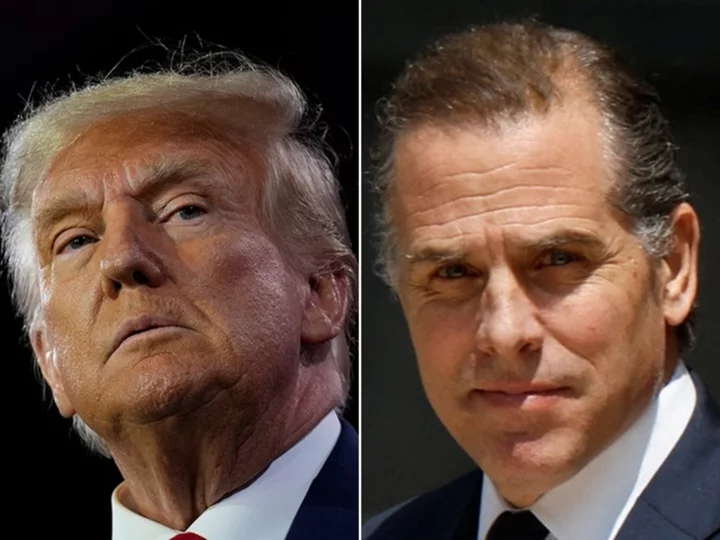
How a new twist in the Hunter Biden case and Trump's possible third indictment are defining the 2024 campaign
A legal drama involving Hunter Biden on Wednesday showed how a presidential race already reeling from a possible third criminal indictment of Donald Trump is being defined more by courtroom action than campaign trail fireworks.
2023-07-27 12:16
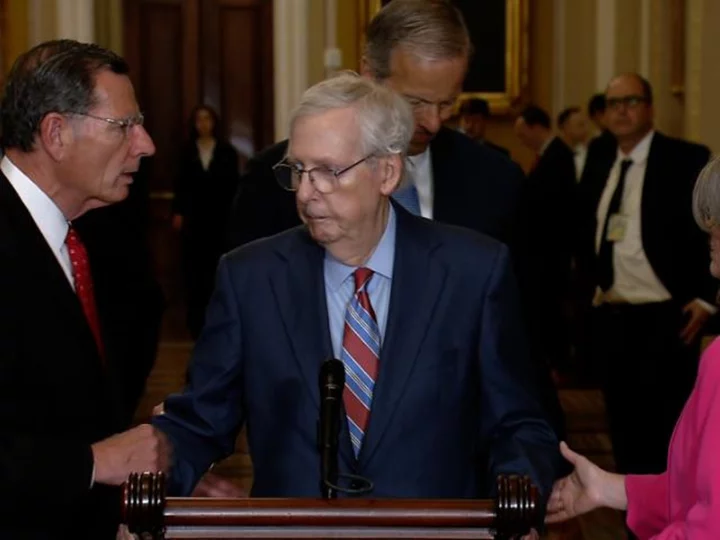
McConnell says he's 'fine' after freezing during news conference
Senate Minority Leader Mitch McConnell told reporters that he's "fine," after freezing during a news conference on Wednesday.
2023-07-27 09:47

El Salvador plans mass trials for those imprisoned in gang crackdown
New rules passed by El Salvador’s congress Wednesday will allow courts to try accused gang members in mass trials, in an effort to expedite tens of thousands of cases for those detained under the country’s crackdown on street gangs. The changes to the country’s criminal code are just the latest in President Nayib Bukele’s war on the Barrio 18 and Mara Salvatrucha (MS-13) gangs, which began last year when the leader declared a “state of emergency” in response to a wave of violence. His government suspended constitutional rights and has detained 71,976 people accused of being in gangs, or 1% of the country’s population. They have been jammed into prisons, fueling waves of accusations of human rights violations. As little as 30% of those detained have clear ties to organized crime, the human rights group Cristosal estimates. The new rules allow trials to be held for groups of defendants based on what area they lived in and what “clique” — a smaller group within a gang — controlled that territory. The legislation also increases prison time for those found to be gang leaders from 45 years to 60. The government has used similar strategies in other parts of the crackdown, rounding up large groups of people often based on how they looked and where they lived. It also carried out mass arraignments, at which judges faced anywhere from 50 to 500 detainees at once, often not considering documents and other evidence that speak to the character of those facing charges. The new trial rules, which were proposed weeks before, were pushed through by the Bukele-supporting majority in congress, while a smaller set of opposition politicians voted against the change. Johnny Wright Sol, from the conservative Nuestro Tiempo party, called the changes “a scheme designed to carry out the government’s plan to keep all those detained without a firm conviction.” “Doing these kinds of mass convictions just as they’ve done with captures is violating due process and violating the individual rights of all those accused,” he said. Read More Ukraine war’s heaviest fight rages in east - follow live Charity boss speaks out over ‘traumatic’ encounter with royal aide
2023-07-27 09:27
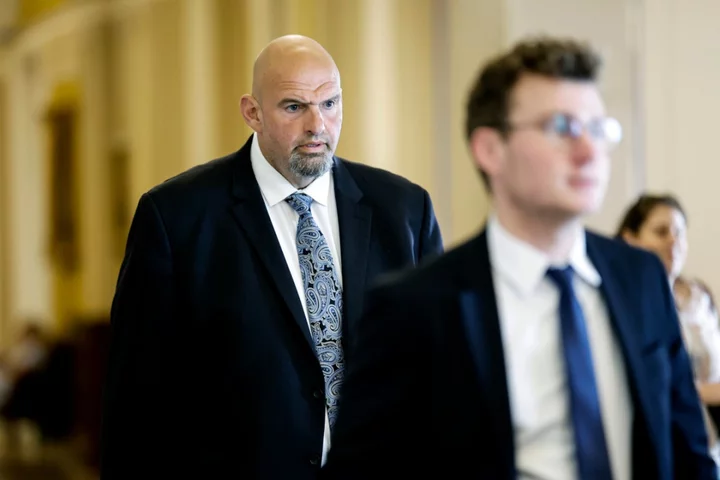
Senator John Fetterman gives emotional speech about disability rights after recovering from stroke
Senator John Fetterman (D-PA) delivered an emotional speech about his disability to commemorate the 33rd anniversary of the Americans with Disabilities Act. Mr Fetterman spoke via video message in his signature Carhartt shirt at the American Association of People with Disabilities’ celebration of the landmark law that passed in 1990 with overwhelming bipartisan support. During his campaign for Senate last year, Mr Fetterman suffered a stroke which affected his auditory processing. As a result, he now uses speech-to-text technology. “The reality is that all Americans should be able to get access to the support that they need,” he said. “The Americans with Disabilities Act makes this possible.” In February, Mr Fetterman checked into Walter Reed Medical Center to undergo treatment for depression. He checked out at the end of March and has since returned to the United States Senate. “I want to thank your community for the work that you have done to make sure people with disabilities can run for and win office,” he said. Mr Fetterman appeared at the celebration with other elected officials including Sen Tammy Duckworth (D-IL); Steny Hoyer (D-MD), the former House majority whip; and Rep Debbie Dingell (D-MI). Transportation Secretary Pete Buttigieg also attended. “Now that I’m a senator, I’m going to continue to fight for disability rights in DC,” Mr Fetterman said. But many of the people at the event also highlighted the work that needed to be done to make places more accessible. Ms Duckworth, who lost both of her legs serving in the Iraq War, talked about how she took her two daughters to see the Barbie movie but could not go because the elevator did not work. “And so my two girls watched a movie with their nanny with me sitting outside for two and a half hours waiting for them to be done,” Ms Duckworth said, noting how nobody had informed her that the elevator was broken until after she bought a ticket. “It is 2023 folks we can and will and should do better.” She also pointed out how it is still legal to pay people with disabilities below the minimum wage and that medical equipment continues to get broken when people with disabilities travel by air. As a result, she said she is pushing for wheelchairs to be considered complex medical devices so they could not be destroyed. Similarly, Transportation Secretary Pete Buttigieg appeared over the video to discuss how the Transportation Department had begun preliminary work to stay in their wheelchairs as they fly. “And today we’re pleased to officially announce the rule that will increase the size of accessibility of airplane bathrooms to better accommodate access on board,” he said. The anniversary comes after many people who helped pass the ADA such as disability rights Judith Heumann and the late Sen Lowell Weicker, a Republican from Connecticut, and C Boyden Gray, an adviser to former president George HW Bush, passed away earlier this year. Ms Duckworth spoke about how eventually, plenty of people will need to use the accommodations that the ADA guarantees. “I hope one day you develop one because that will mean that you've lived a long life and maybe that you'll care about disabled access,” she said. Read More Back in hoodies and gym shorts, Fetterman tackles Senate life after depression treatment Hunter Biden’s plea deal appears at risk of falling apart. What happens next? Trump wants to see Biden impeached, and other Republicans are quick to pile on House UFO hearing probes claims of physics defying technology
2023-07-27 08:22

Concerns mount over potential for food crisis amid Russian moves to cripple Ukrainian grain exports
The US and its allies are grappling with how to avert a global food crisis following Moscow's withdrawal from the Black Sea grain deal and its subsequent attacks on Ukraine's ports and storage facilities.
2023-07-27 07:56
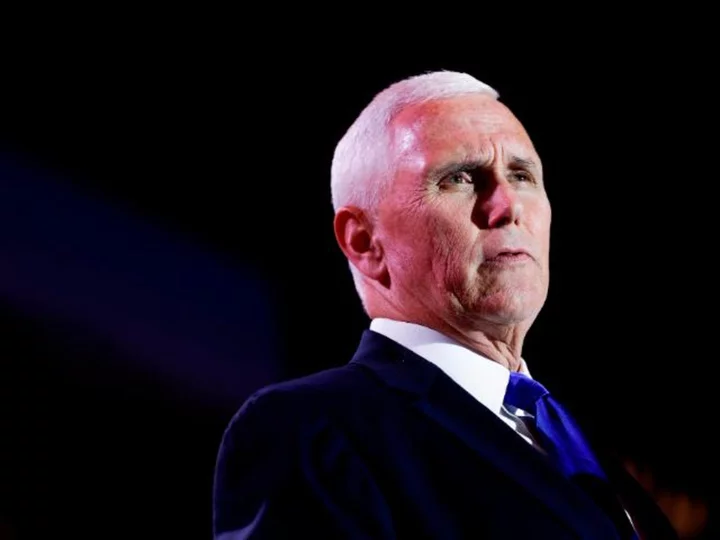
Pence unveils economic proposal that includes eliminating EPA and CFPB
Former Vice President Mike Pence on Wednesday released an economic proposal to tackle high inflation that includes cutting government programs, the Environmental Protection Agency and President Joe Biden's incentives aimed at curbing impacts of climate change.
2023-07-27 07:24
